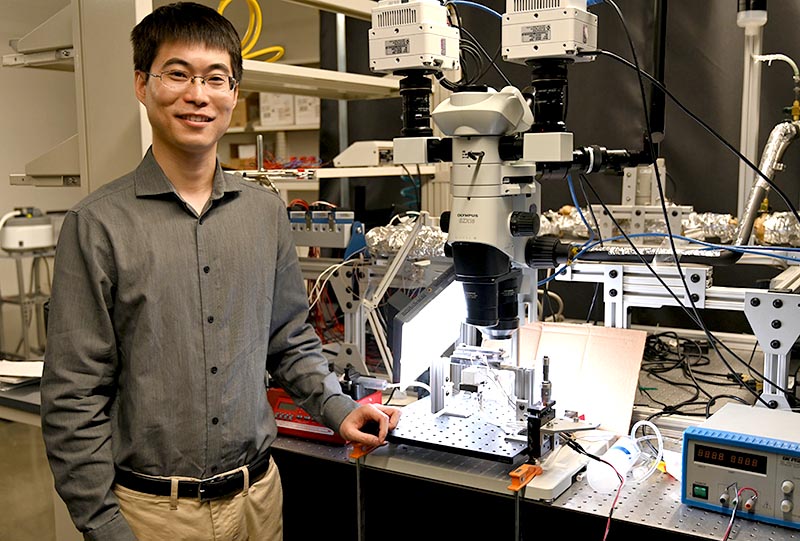May 22, 2023

Yue Jin has been interested in nuclear power as a clean energy source since his undergraduate studies at a top-ranked university in China. So, after completing a PhD from Pennsylvania State University and working as a post-doctoral fellow at MIT, he saw Mizzou as an obvious next step.
“I came here because of the MU Research Reactor, the highest-powered university research reactor in the U.S.,” said Jin, who started last year as an assistant professor in mechanical and aerospace engineering. “And the mechanical engineering program at Mizzou is great. I saw opportunities to develop collaborations within the department, the College and MURR. It’s the perfect platform for me to grow and expand my work.”
At Mizzou, Jin is director of the Advanced Flow and Heat Transfer Lab, where his team works to advance technology to solve climate challenges and meet growing clean energy demands. He’s studying fluid flow and heat transfer behavior spanning different scales and alternatives to water, such as liquid metals and molten salts, that can be used as cooling agents in power generation and energy conversion systems.
“The ultimate goal is to increase energy efficiency and safety,” he said. “Nuclear industry energy components are getting smaller and more compact, and as a result the energy density gets higher and higher. We need a novel way to cool highly dense, compact energy systems.”
This past semester, Jin received two grants for his work. With funding from MU’s Research Council, he is developing of an innovative model that combines physics-based principles and data-driven techniques to predict crucial heat flux (CHF).
“Critical heat flux indicates a system is no longer able to remove heat effectively and leads to dangerously high temperatures,” he said. “We cannot go beyond the CHF point, so it’s important to predict those values as accurately as possible.”
CHF prediction is tough because it is connected to various systems and fluid conditions. Traditional models have high uncertainties and can only be applied in limited situations.
However, continued advances in artificial intelligence (AI) and machine learning (ML) algorithms have made it possible to develop a sophisticated data-driven CHF model that can effectively capture the complex flow and heat transfer processes that occur across different scales of length and time. The ML approach is particularly advantages for solving complicated non-linear problems, as it has a fast convergence speed. This makes it highly suitable for challenging problems such as CHF prediction.
A separate grant from the Nuclear Regulatory Commission, through Penn State, focuses on the study of droplet dynamics and two-phase flow heat transfer in the 7-by-7 rod assembly found in nuclear power plants using a specialized laser imaging test facility. Specifically, researchers are simulating accident scenarios and how coolants can be reintroduced into a system following a loss of coolant accident (LOCA).
“With the obtained high-resolution experimental data for liquid droplet behavior and heat transfer, sophisticated theoretical models could be developed to further improve our numerical code simulation accuracy, such as TRACE and COBRA-TF,” Jin said. “The AI and ML techniques will also be explored in this project based on the abundant data obtained.”
At Mizzou, Jin is beginning to grow his research team, and welcomes both graduate and undergraduate students who want to work on clean energy solutions.
He’s also looking forward to collaborating with more faculty, both within and outside of engineering.
“I’m already collaborating with Professor Chung-Lung Chen, and he’s been a great mentor,” Jin said. “I welcome more partnerships as we try to better understand increasing complex phenomena.”
Visit the Advanced Flow and Heat Transfer Lab website to learn more.